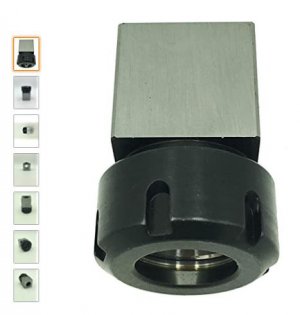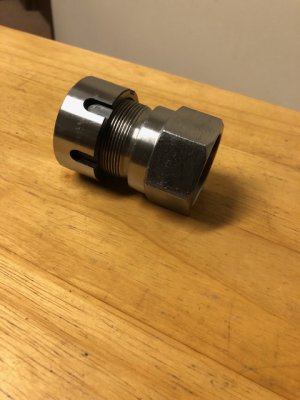-
Welcome back Guest! Did you know you can mentor other members here at H-M? If not, please check out our Relaunch of Hobby Machinist Mentoring Program!
You are using an out of date browser. It may not display this or other websites correctly.
You should upgrade or use an alternative browser.
You should upgrade or use an alternative browser.
Atlas / Craftsman 12'' Metal Lathe Restoration [1937]
- Thread starter Red Beard Ops
- Start date
-
- Tags
- atlas craftsman restoration
- Joined
- Dec 25, 2011
- Messages
- 10,552
They were certainly usable on the pulley end of the armature, or at least the 59B was. But what actually came with the Jacobs armature chuck kit was the 75A for the pulley end and the 100CR for the commutator end, with two 2MT to 3JT arbors. With the 2MT arbor in the 75A, you had to use the 2MT/3MT adapter sleeve that came with all three of the larger lathes. Or you could special order the kit with a 3MT to 3JT arbor instead of one of the 2MT to 3JT ones.
- Joined
- Sep 12, 2020
- Messages
- 56
Nice job on the restoration. I enjoyed the video and hope this lathe brings you many years of useful service.
If you can, I would certainly consider an ER chuck for small parts.
Thank you sir! Me too
I was thinking of getting one of these ER Chuck Blocks that I could mount in my 4 jaw. I was thinking it could be handy on the mill too.

- Joined
- Dec 20, 2012
- Messages
- 9,422
There is this thing called stacking tolerances that you have to be aware of. Every single component between the spindle and the work piece has its own run out and the more interfaces you have, the greater the run out will be. If you use that collet block in a 4 jaw you have: the run out of the spindle, the lathe chuck, how accurate you are in dialing in the collet block, the collet block itself, the taper inside the collet block, the accuracy of the collet, the collet nut, how accurately you tighten the collet nut and the accuracy of the work piece. All of these interfaces add up, or stack up, to affect run out.
The most accurate way to reduce this stack is to find/make/buy a direct mount ER chuck that threads onto your spindle. You won't be able to eliminate run out but it is possible to get it waaay down. This is not as critical on the lathe as it is on a milling machine but when working on small precision parts, it can make a difference.
Do you happen to know what the size of your threaded spindle is?
The most accurate way to reduce this stack is to find/make/buy a direct mount ER chuck that threads onto your spindle. You won't be able to eliminate run out but it is possible to get it waaay down. This is not as critical on the lathe as it is on a milling machine but when working on small precision parts, it can make a difference.
Do you happen to know what the size of your threaded spindle is?
- Joined
- Sep 12, 2020
- Messages
- 56
There is this thing called stacking tolerances that you have to be aware of. Every single component between the spindle and the work piece has its own run out and the more interfaces you have, the greater the run out will be. If you use that collet block in a 4 jaw you have: the run out of the spindle, the lathe chuck, how accurate you are in dialing in the collet block, the collet block itself, the taper inside the collet block, the accuracy of the collet, the collet nut, how accurately you tighten the collet nut and the accuracy of the work piece. All of these interfaces add up, or stack up, to affect run out.
The most accurate way to reduce this stack is to find/make/buy a direct mount ER chuck that threads onto your spindle. You won't be able to eliminate run out but it is possible to get it waaay down. This is not as critical on the lathe as it is on a milling machine but when working on small precision parts, it can make a difference.
Do you happen to know what the size of your threaded spindle is?
Thanks for the explanation, sir! I'm fairly sure my threads on the spindle are 1-1/2''- 8
- Joined
- Dec 20, 2012
- Messages
- 9,422
You might consider a Beall ER32 chuck with a 1-1/2-8 thread. It should directly spin on to your spindle and is pretty accurate. I use one on a Sherline lathe and because my spindle is very accurate, this chuck holds about 0.0001" TIR on that spindle. The chuck will also accept aftermarket nuts and I can highly recommend a Rego-Fix HiQ nut if you buy this chuck. There are coated and ball bearing versions from this company and we can discuss that later.
The Beall chuck comes as a package with some collets but you can also just buy the chuck and nut and wrenches, then buy a complete ER32 set of collets. You do not need high end collets for the lathe; an import set will do. If you add an ER chuck to your mill then buy a set or at least the sizes you most often use from a high quality source like Techniks, ETM, Rego-Fix and others.
The Beall chuck comes as a package with some collets but you can also just buy the chuck and nut and wrenches, then buy a complete ER32 set of collets. You do not need high end collets for the lathe; an import set will do. If you add an ER chuck to your mill then buy a set or at least the sizes you most often use from a high quality source like Techniks, ETM, Rego-Fix and others.
- Joined
- Mar 22, 2014
- Messages
- 870
One word of caution with the ER collet blocks. I purchased a cheap import on eBay. While the collet taper was nicely made, the square was not. The sides were not equal distant from the collet center.
I made an ER40 collet adapter for my lathe. It screws onto the 1-1/2x8 spindle. It can hold down to 3/32" diameter if I recall correctly. It was a nice fun project. If you search on this website you will find a description.
I'd like one of the Jacob'scollets chucks that screw onto the spindle but they tend to be pricey. Even a worn one sells for $100.
I made an ER40 collet adapter for my lathe. It screws onto the 1-1/2x8 spindle. It can hold down to 3/32" diameter if I recall correctly. It was a nice fun project. If you search on this website you will find a description.
I'd like one of the Jacob's
Last edited:
- Joined
- Nov 5, 2019
- Messages
- 233
For an Atlas lathe I would recommend the ER32 collet w/1 1/2-8 thread from Tallgrass tools over the Beale for a couple of reasons. I ordered a Beale and was getting .0035 runout at the bore. My spindle runs out .0005. Maybe I just got a bad one but I returned it and bought the tallgrass. This was machined more accurately, has a register that matches the Atlas spindle and has a hex nut for removal/install. This chuck with decent collets runs out at .0005 which is good enough for me.

